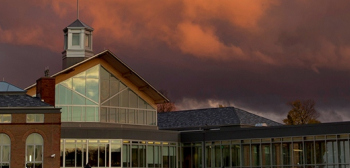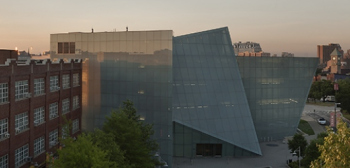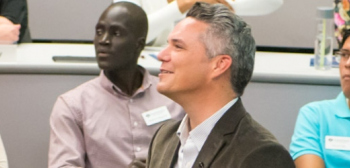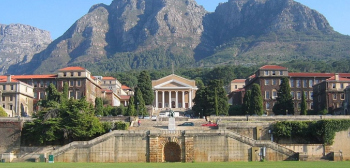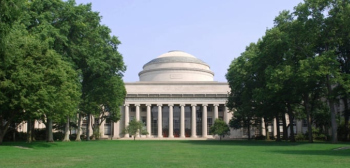明尼苏达大学
About
Read more
Read less
The University of Minnesota is one of the most comprehensive public universities in the United States and ranks among the most prestigious. It is both the state land-grant university, with a strong tradition of education and public service, and the state's primary research university, with faculty of national and international reputation. Founded in 1851, the University of Minnesota has four campuses�Twin Cities, Duluth, Morris, and Crookston�a collaborative center in Rochester, extension offices, and research and outreach centers throughout the state. The University of Minnesota, founded in the belief that all people are enriched by understanding, is dedicated to the advancement of learning and the search for truth; to the sharing of this knowledge through education for a diverse community; and to the application of this knowledge to benefit the people of the state, the nation, and the world. The University's mission, carried out on multiple campuses and throughout the state, is threefold: Research and DiscoveryGenerate and preserve knowledge, understanding, and creativity by conducting high-quality research, scholarship, and artistic activity that benefit students, scholars, and communities across the state, the nation, and the world. Teaching and Learning Share that knowledge, understanding, and creativity by providing a broad range of educational programs in a strong and diverse community of learners and teachers, and prepare graduate, professional, and undergraduate students, as well as non-degree-seeking students interested in continuing education and lifelong learning, for active roles in a multiracial and multicultural world. Outreach and Public Service Extend, apply, and exchange knowledge between the University and society by applying scholarly expertise to community problems, by helping organizations and individuals respond to their changing environments, and by making the knowledge and resources created and preserved at the University accessible to the citizens of the state, the nation, and the world. In all of its activities, the University strives to sustain an open exchange of ideas in an environment that embodies the values of academic freedom, responsibility, integrity, and cooperation; that provides an atmosphere of mutual respect, free from racism, sexism, and other forms of prejudice and intolerance; that assists individuals, institutions, and communities in responding to a continuously changing world; that is conscious of and responsive to the needs of the many communities it is committed to serving; that creates and supports partnerships within the University, with other educational systems and institutions, and with communities to achieve common goals; and that inspires, sets high expectations for, and empowers individuals within its community.
About
The University of Minnesota is one of the most comprehensive public universities in the United States and ranks among the most prestigious. It is both the state land-grant university, with a strong tradition of education and public service, and the state's primary research university, with faculty of national and international reputation. Founded in 1851, the University of Minnesota has four campuses�Twin Cities, Duluth, Morris, and Crookston�a collaborative center in Rochester, extension offices, and research and outreach centers throughout the state. The University of Minnesota, founded in the belief that all people are enriched by understanding, is dedicated to the advancement of learning and the search for truth; to the sharing of this knowledge through education for a diverse community; and to the application of this knowledge to benefit the people of the state, the nation, and the world. The University's mission, carried out on multiple campuses and throughout the state, is threefold: Research and DiscoveryGenerate and preserve knowledge, understanding, and creativity by conducting high-quality research, scholarship, and artistic activity that benefit students, scholars, and communities across the state, the nation, and the world. Teaching and Learning Share that knowledge, understanding, and creativity by providing a broad range of educational programs in a strong and diverse community of learners and teachers, and prepare graduate, professional, and undergraduate students, as well as non-degree-seeking students interested in continuing education and lifelong learning, for active roles in a multiracial and multicultural world. Outreach and Public Service Extend, apply, and exchange knowledge between the University and society by applying scholarly expertise to community problems, by helping organizations and individuals respond to their changing environments, and by making the knowledge and resources created and preserved at the University accessible to the citizens of the state, the nation, and the world. In all of its activities, the University strives to sustain an open exchange of ideas in an environment that embodies the values of academic freedom, responsibility, integrity, and cooperation; that provides an atmosphere of mutual respect, free from racism, sexism, and other forms of prejudice and intolerance; that assists individuals, institutions, and communities in responding to a continuously changing world; that is conscious of and responsive to the needs of the many communities it is committed to serving; that creates and supports partnerships within the University, with other educational systems and institutions, and with communities to achieve common goals; and that inspires, sets high expectations for, and empowers individuals within its community.
University highlights
- 2012#104
- 2014#=102
- 2015#119
- 2016#123
- 2017#137
- 2018#163
- 2019#=156
- 2020#=156
- 2021#=177
- 2022#=186
- 2023#=185
- 2024#195
- 2025#=203
- 2026#210
QS Stars is a rating system that helps you select the right university based on your
interests. It provides a detailed look at an institution, identifying which universities rate highest in
the
specific topics that matter to you, like facilities, graduate employability, social responsibility,
inclusiveness, and more.
Campus locations
Twin Cities Campus,
3 Morrill Hall, 100 Church Street , Minneapolis , Minnesota , United States , 55455
Similar Universities
乔治华盛顿大学商学院
George Washington University, Washington D.C.
德克萨斯大学阿灵顿大学
701 S. Nedderman Drive, Arlington
马里兰州立大学艺术学院
1300 W. Mount Royal Avenue, Baltimore
罗彻斯特理工大学 (RIT)
Lomb Memorial Drive, Rochester
雷鸟全球管理学院
400 E Van Buren, Phoenix
Test preparations
University of Minnesota Twin Cities
CN







